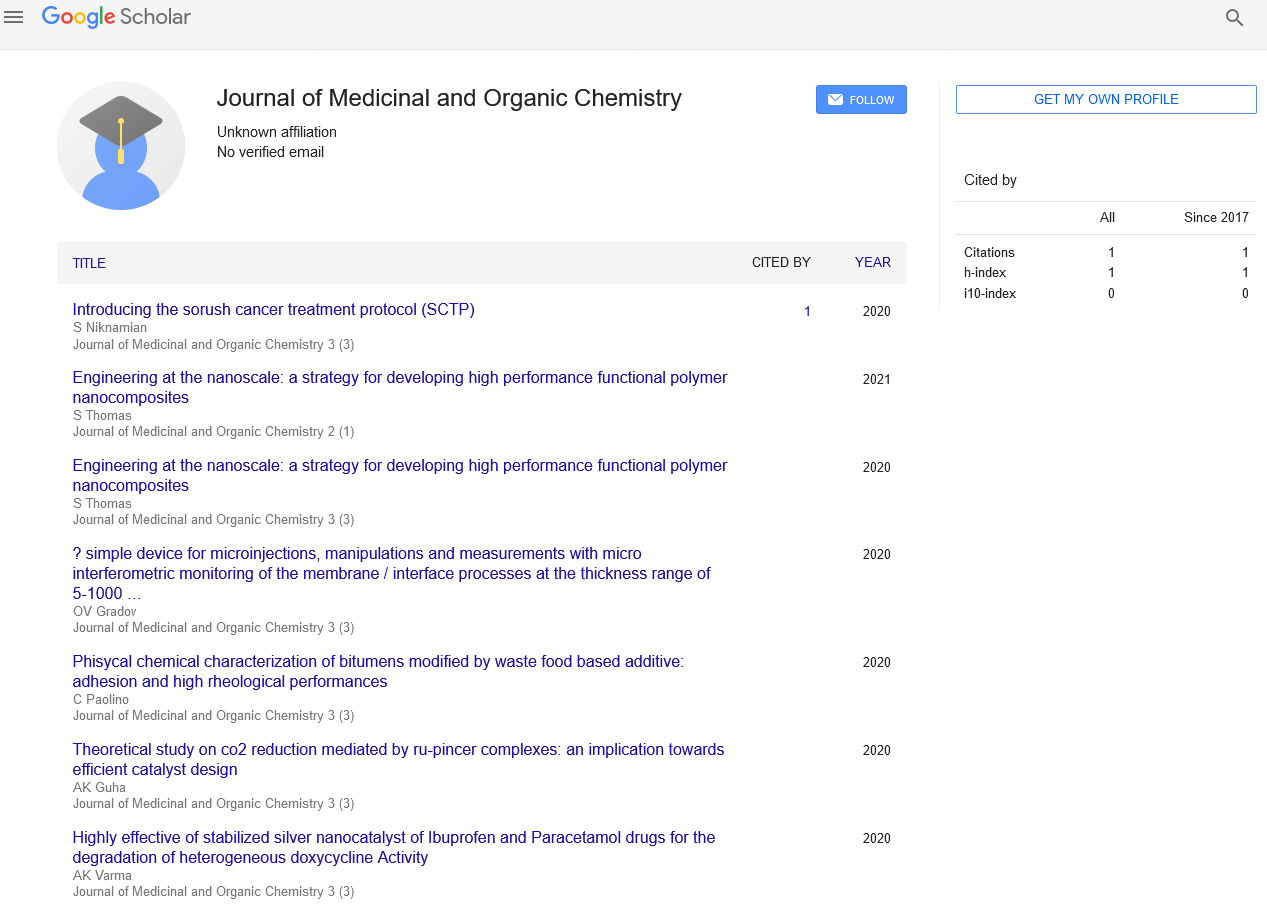Perspective - Journal of Medicinal and Organic Chemistry (2023) Volume 6, Issue 6
Nourishing the Body and Mind: Exploring the Depths of Nutrition
- Corresponding Author:
- Masaki Mukami
Department of Nutrition Science,
Toyako University,
Tokyo,
Japan
E-mail: makami@igm.hokudai.ac.jp
Received: 15-Nov-2023, Manuscript No. jmoc-23-121588; Editor assigned: 21-Nov-2023, PreQC No. jmoc-23-121588 (PQ); Reviewed: 06-Dec-2023, QC No. jmoc-23- 121588; Revised: 13-Dec-2023, Manuscript No. jmoc-23-121588 (R); Published: 29-Dec-2023, DOI: 10.37532/jmoc.2023.6(6).149-150
Introduction
In the intricate web of health and wellness, nutrition stands as a cornerstone, influencing not only the physical well-being of individuals but also the intricate workings of the mind. The field of nutrition is a dynamic tapestry, interwoven with the choices we make in what we eat and drink. This article delves into the multifaceted realm of nutrition, exploring its fundamental principles, the impact of dietary choices on health and the evolving understanding of nutrition’s role in overall well-being.
Description
The basics of nutrition
Macronutrients and micronutrients: At the heart of nutrition are the essential components that make up our diet.
Macronutrients: Carbohydrates, proteins and fats provide the energy necessary for bodily functions.
Micronutrients: Vitamins and minerals act as cofactors in various biochemical processes, supporting everything from immune function to bone health.
The energy balance equation: Achieving a balance between the calories consumed and expended is a fundamental principle of nutrition. This energy balance plays a crucial role in maintaining a healthy weight and preventing the onset of conditions associated with excess or insufficient energy intake.
Nutrition and health
Diet-related diseases: The link between diet and health is undeniable, with poor dietary choices contributing to the rise of non-communicable diseases such as obesity, diabetes and cardiovascular diseases. Understanding the role of nutrition in disease prevention is a key aspect of promoting public health.
Gut health: The gut microbiome, a complex ecosystem of microorganisms residing in the digestive tract, has emerged as a focal point in nutrition research. The composition of the gut microbiome is influenced by dietary patterns and plays a crucial role in digestion, nutrient absorption and overall immune function.
Mental health and nutrition: Beyond physical health, nutrition has profound implications for mental well-being. The emerging field of nutritional psychiatry explores the connection between diet and mental health, highlighting the influence of nutrients on brain function and the potential role of nutrition in managing conditions such as depression and anxiety.
Evolving dietary patterns
Plant-based diets: The shift towards plant-based diets reflects a growing awareness of the environmental and health implications of food choices. Plant-based diets, whether vegetarian or vegan, emphasize a diverse array of fruits, vegetables, whole grains and legumes, offering potential benefits for both personal health and the planet.
Personalized nutrition: Advances in genetics and technology have paved the way for personalized nutrition a tailored approach that considers an individual’s unique genetic makeup, lifestyle and health goals. Personalized nutrition aims to optimize dietary recommendations, recognizing that one-size-fits-all approaches may not be universally effective.
Nutrition education and empowerment
Nutrition literacy: In a world inundated with information, promoting nutrition literacy is essential. Understanding food labels, deciphering nutritional information and making informed choices empower individuals to take control of their health through mindful eating.
Early childhood nutrition: The i mpact o f nutrition begins in early childhood, influencing growth, development, and long-term health outcomes. Educating parents and caregivers on the importance of nutrition during the formative years sets the stage for a lifetime of healthy habits.
Challenges and opportunities
Global nutrition disparities: Disparities in access to nutritious food persist globally, with socioeconomic factors influencing dietary patterns. Addressing these disparities requires a multifaceted approach that includes education, policy changes and initiatives to enhance food security.
The influence of food marketing: The omnipresence of food marketing, often promoting highly processed and unhealthy options, poses a challenge to public health efforts. Counteracting the influence of such marketing requires advocacy for policies that prioritize the promotion of nutritious choices.
Conclusion
High blood pressure, as a silent and pervasive contributor to stroke risk, underscores the importance of proactive management and prevention strategies. Understanding the complex tapestry of stroke causes involves recognizing the intricate dance between hypertension, atherosclerosis and various contributing factors. As the medical community continues to unravel the nuances of stroke etiology, the role of hypertension remains a focal point in bridging the gap to effective stroke prevention, offering the potential for better outcomes and a reduced global burden of this critical neurological condition.

